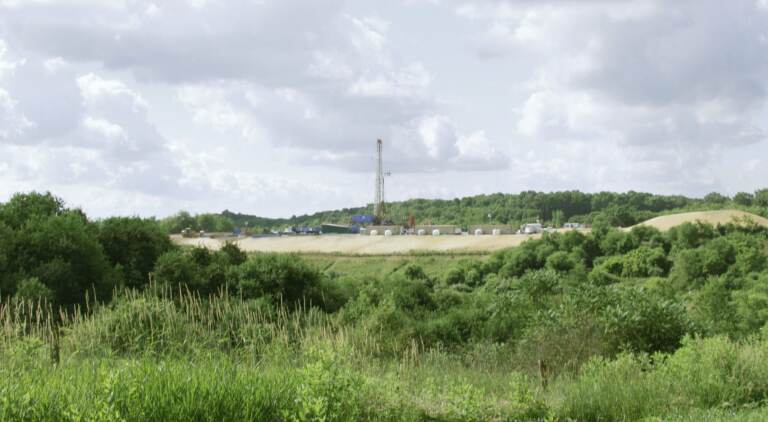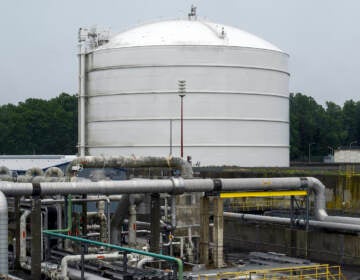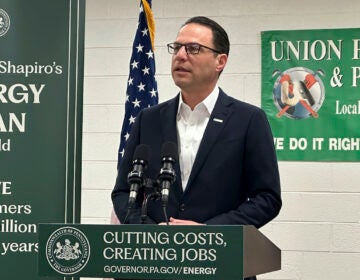Pa.’s natural gas industry set to get billions in state tax credits
Environmental groups criticize the tax credits because they would heavily subsidize natural gas production, a process that emits the potent greenhouse gas methane.

A crew works on a drilling rig at a well site for shale based natural gas on Monday, June 25, 2012 in Zelienople, Pa. (Keith Srakocic/AP)
This article originally appeared on StateImpact Pennsylvania.
Pennsylvania lawmakers are sending a nearly $2 billion package of tax credits aimed at supporting the state’s natural gas industry to Governor Tom Wolf’s desk.
Wolf is expected to sign the bill.
The credits would offset tens of millions in taxes each year until 2050 to select companies that use gas, like those in the milk and chemical production industries. But, they must build facilities in Pennsylvania and create a certain number of new jobs.
The legislation comes at a time when experts say greenhouse gas emissions must be cut dramatically to avoid the worst effects of climate change – including by transitioning away from fossil fuels. Pennsylvania has a goal of reducing greenhouse gas emissions 26% by 2025 and 80% by 2050, compared to 2005 levels.
Environmental groups criticize the tax credits because they would heavily subsidize natural gas production, a process that emits the potent greenhouse gas methane.
Rep. Greg Vitali (D-Delaware) called the agreement, which was quietly negotiated for some time, a “backroom deal.”
Patrick McDonnell – formerly Wolf’s secretary of the Department of Environmental Protection who now leads the statewide lobbying group PennFuture – said the legislation is “slapdash industrial policy at its worst that will perpetuate Pennsylvania’s addiction to fossil fuels.”
Overall, the bill creates $1.97 billion in tax credits. It earmarks $50 million a year for hydrogen production subsidies. Hydrogen’s main byproduct is water, and if it’s produced with renewable energy – called “green” hydrogen – it produces no carbon emissions. Another method, called “blue” hydrogen, still produces some emissions.
State leaders say they want those firms to help build a regional hydrogen hub. The Biden administration is putting $7 billion toward the creation of such hubs across the country.
Mark Szybist, senior attorney for the Climate and Clean Energy Program at Natural Resources Defense Council, called the bill “deeply flawed.”
The tax credits, he said, “provide massive financial support to petrochemical manufacturing and shale gas extraction unconditioned on either pollution limits or protections for communities where supported facilities will be located.”
The proposal creates $15 million annually in tax credits over eight years for companies in milk processing industry, and $20 million annually over five years for semiconductor and biomedical research companies, if they use natural gas and create new facilities and jobs.
House Speaker Bryan Cutler (R-Lancaster) said the $15 million annual tax credits for milk processing would require investments of at least $500 million and the creation of at least 1,200 jobs. The $20 million annual tax credits for the biomedical and semiconductor manufacturing facilities would require investment of at least $200 million and the creation of 800 jobs.
Environmental groups like the Clean Air Council criticize the deal, saying there’s no guarantee the subsidies will create new permanent jobs.
Cutler (R-Lancaster) said the legislation honors “industries that have sustained many of us.”
“The package will result in billions of dollars in career-creating investment in industries that will put our Commonwealth at the center of where the world is heading,” he said.
Rep. Dawn Keefer (R-York) says ideas like this have been tried before with little effect.
“We continue to lose populations. We just lost another congressional seat,” she said. “But you know what? Let’s do another round of tax credits. Doing the same thing over and over again and expecting different results. That’s the definition of insanity.”
Editor’s Note The original version of this story reported an incorrect total amount of the tax credits that were approved in the final bill.
WHYY is your source for fact-based, in-depth journalism and information. As a nonprofit organization, we rely on financial support from readers like you. Please give today.






